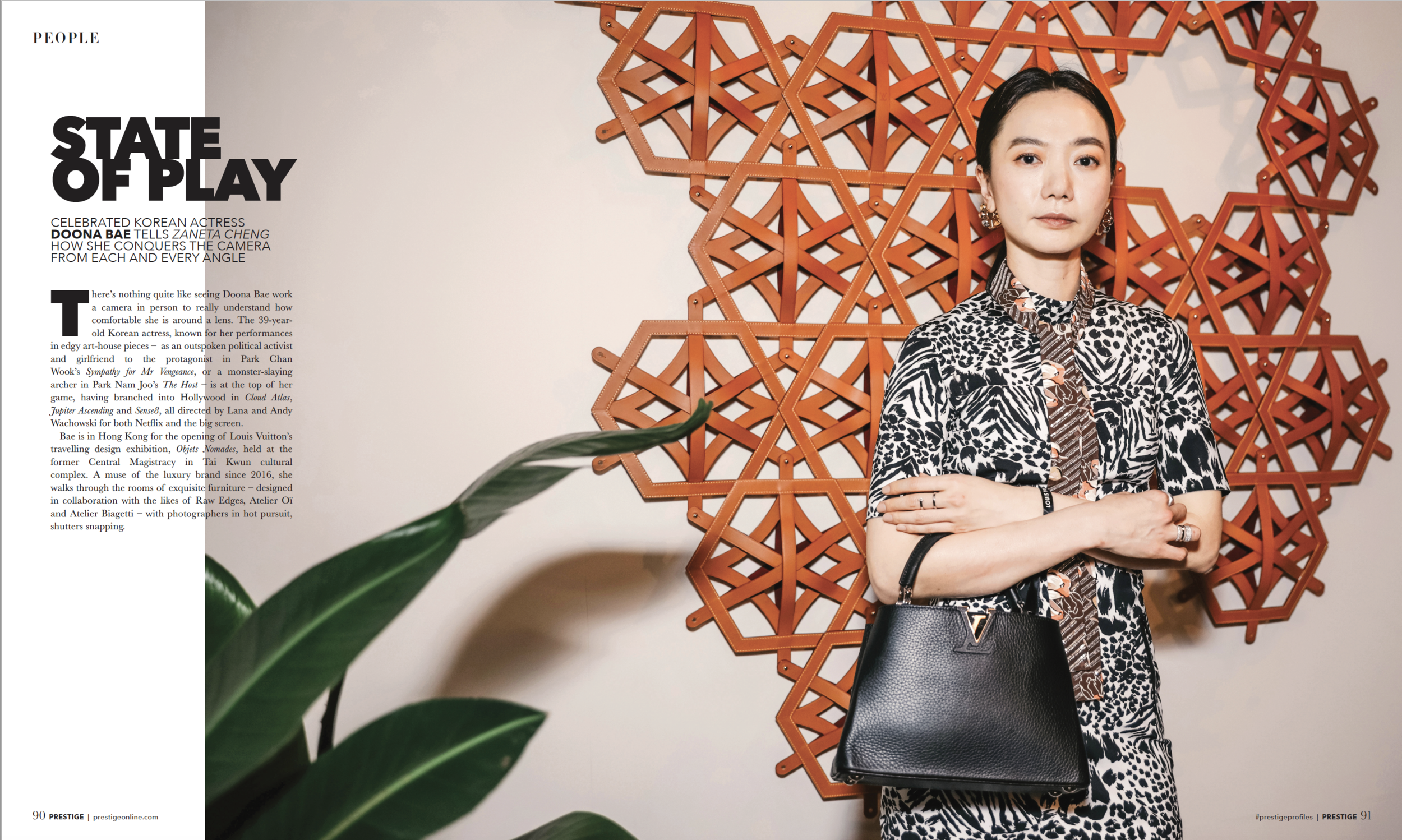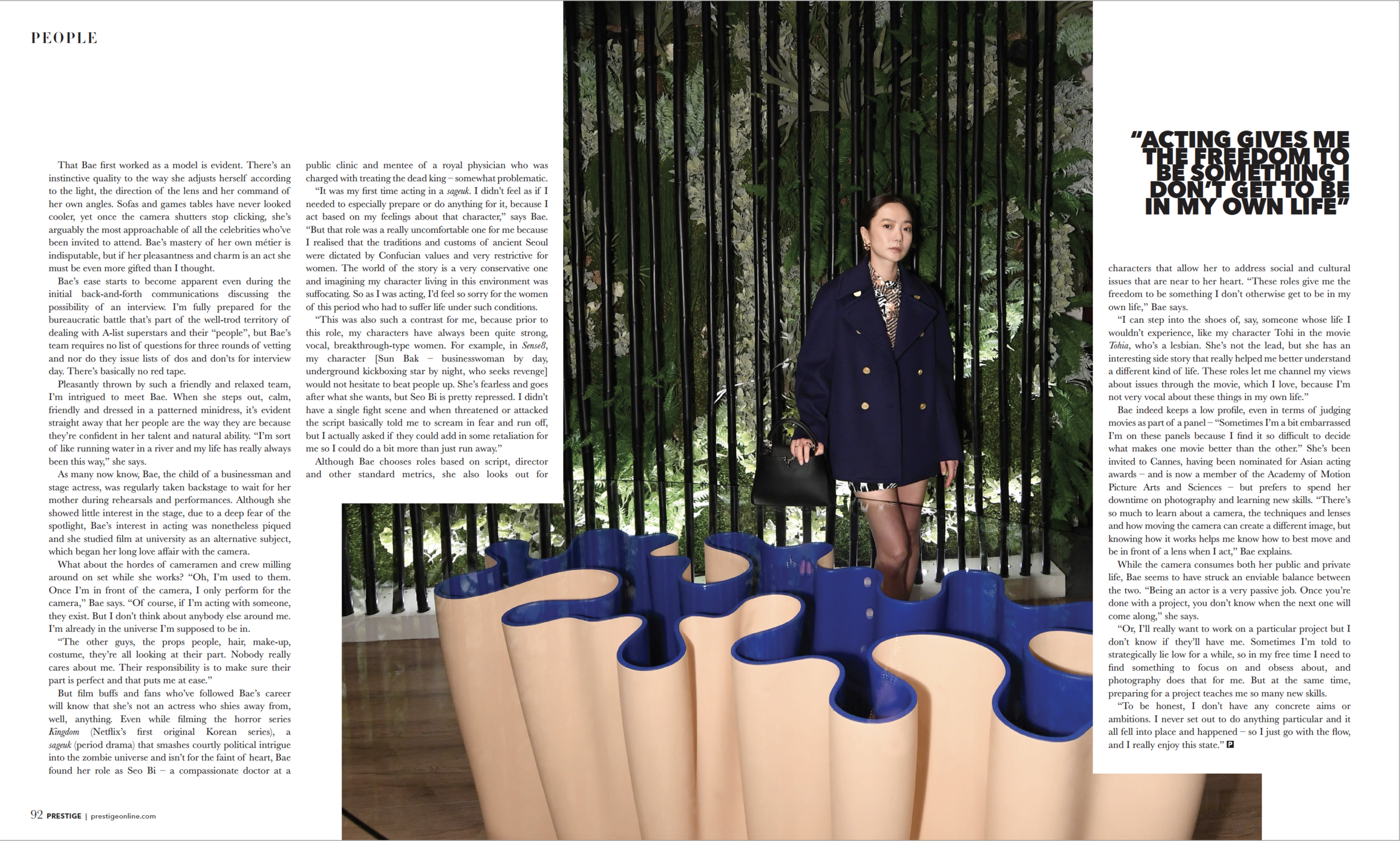Doona Bae | Prestige Hong Kong (Jul 19)
Celebrated Korean actress Doona Bae tells zaneta cheng how she conquers the camera from each and every angle
There’s nothing quite like seeing Doona Bae work a camera in person to really understand how comfortable she is around a lens. The 39-year-old Korean actress, known for her performances in edgy art-house pieces – as an outspoken political activist and girlfriend to the protagonist in Park Chan Wook’s Sympathy for Mr Vengeance, or a monster-slaying archer in Park Nam Joo’s The Host – is at the top of her game, having branched into Hollywood in Cloud Atlas, Jupiter Ascending and Sense8, all directed by Lana and Andy Wachowski for both Netflix and the big screen.
Bae is in Hong Kong for the opening of Louis Vuitton’s travelling design exhibition, Objets Nomades, held at the former Central Magistracy in Tai Kwun cultural complex. A muse of the luxury brand since 2016, she walks through the rooms of exquisite furniture – designed in collaboration with the likes of Raw Edges, Atelier Oï and Atelier Biagetti – with photographers in hot pursuit, shutters snapping.
That Bae first worked as a model is evident. There’s an instinctive quality to the way she adjusts herself according to the light, the direction of the lens and her command of her own angles. Sofas and games tables have never looked cooler, yet once the camera shutters stop clicking, she’s arguably the most approachable of all the celebrities who’ve been invited to attend. Bae’s mastery of her own métier is indisputable, but if her pleasantness and charm is an act she must be even more gifted than I thought.
Bae’s ease starts to become apparent even during the initial back-and-forth communications discussing the possibility of an interview. I’m fully prepared for the bureaucratic battle that’s part of the well-trod territory of dealing with A-list superstars and their “people”, but Bae’s team requires no list of questions for three rounds of vetting and nor do they issue lists of dos and don’ts for interview day. There’s basically no red tape.
Pleasantly thrown by such a friendly and relaxed team, I’m intrigued to meet Bae. When she steps out, calm, friendly and dressed in a patterned minidress, it’s evident straight away that her people are the way they are because they’re confident in her talent and natural ability. “I’m sort of like running water in a river and my life has really always been this way,” she says.
As many now know, Bae, the child of a businessman and stage actress, was regularly taken backstage to wait for her mother during rehearsals and performances. Although she showed little interest in the stage, due to a deep fear of the spotlight, Bae’s interest in acting was nonetheless piqued and she studied film at university as an alternative subject, which began her long love affair with the camera.
What about the hordes of cameramen and crew milling around on set while she works? “Oh, I’m used to them. Once I’m in front of the camera, I only perform for the camera,” Bae says. “Of course, if I’m acting with someone, they exist. But I don’t think about anybody else around me. I’m already in the universe I’m supposed to be in.
“The other guys, the props people, hair, make-up, costume, they’re all looking at their part. Nobody really cares about me. Their responsibility is to make sure their part is perfect and that puts me at ease.”
But film buffs and fans who’ve followed Bae’s career will know that she’s not an actress who shies away from, well, anything. Even while filming the horror series Kingdom (Netflix’s first original Korean series), a sageuk (period drama) that smashes courtly political intrigue into the zombie universe and isn’t for the faint of heart, Bae found her role as Seo Bi – a compassionate doctor at a public clinic and mentee of a royal physician who was charged with treating the dead king – somewhat problematic.
“It was my first time acting in a sageuk. I didn’t feel as if I needed to especially prepare or do anything for it, because I act based on my feelings about that character,” says Bae. “But that role was a really uncomfortable one for me because I realised that the traditions and customs of ancient Seoul were dictated by Confucian values and very restrictive for women. The world of the story is a very conservative one and imagining my character living in this environment was suffocating. So as I was acting, I’d feel so sorry for the women of this period who had to suffer life under such conditions.
“This was also such a contrast for me, because prior to this role, my characters have always been quite strong, vocal, breakthrough-type women. For example, in Sense8, my character [Sun Bak – businesswoman by day, underground kickboxing star by night, who seeks revenge] would not hesitate to beat people up. She’s fearless and goes after what she wants, but Seo Bi is pretty repressed. I didn’t have a single fight scene and when threatened or attacked the script basically told me to scream in fear and run off, but I actually asked if they could add in some retaliation for me so I could do a bit more than just run away.”
Although Bae chooses roles based on script, director and other standard metrics, she also looks out for characters that allow her to address social and cultural issues that are near to her heart. “These roles give me the freedom to be something I don’t otherwise get to be in my own life,” Bae says.
“I can step into the shoes of, say, someone whose life I wouldn’t experience, like my character Tohi in the movie Tohia, who’s a lesbian. She’s not the lead, but she has an interesting side story that really helped me better understand a different kind of life. These roles let me channel my views about issues through the movie, which I love, because I’m not very vocal about these things in my own life.”
Bae indeed keeps a low profile, even in terms of judging movies as part of a panel – “Sometimes I’m a bit embarrassed I’m on these panels because I find it so difficult to decide what makes one movie better than the other.” She’s been invited to Cannes, having been nominated for Asian acting awards – and is now a member of the Academy of Motion Picture Arts and Sciences – but prefers to spend her downtime on photography and learning new skills. “There’s so much to learn about a camera, the techniques and lenses and how moving the camera can create a different image, but knowing how it works helps me know how to best move and be in front of a lens when I act,” Bae explains.
While the camera consumes both her public and private life, Bae seems to have struck an enviable balance between the two. “Being an actor is a very passive job. Once you’re done with a project, you don’t know when the next one will come along,” she says.
“Or, I’ll really want to work on a particular project but I don’t know if they’ll have me. Sometimes I’m told to strategically lie low for a while, so in my free time I need to find something to focus on and obsess about, and photography does that for me. But at the same time, preparing for a project teaches me so many new skills.
“To be honest, I don’t have any concrete aims or ambitions. I never set out to do anything particular and it all fell into place and happened – so I just go with the flow, and I really enjoy this state.”

